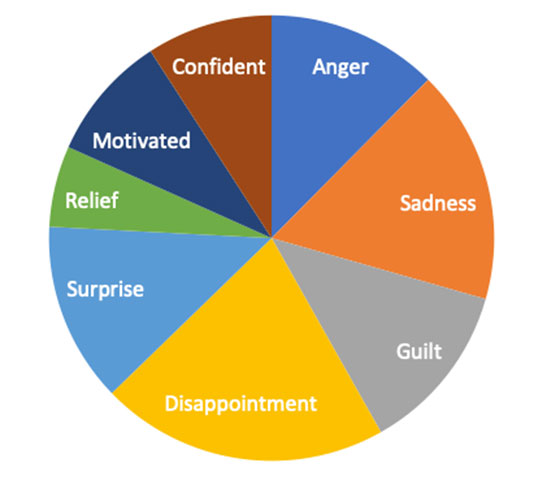In this two-part series, I highlight the experience of facing rejection in academia in order to normalize it and showcase how people use rejection as a catalyst for future achievements. In this article, I discuss why we perceive rejection so negatively and share results from a survey with students about their experiences with rejection in academia.
Now that I'm nearing the end of my PhD, I've been using LinkedIn more frequently to look for job opportunities outside of academia. It's not uncommon to stumble upon several people posting about their achievements and new jobs. Mostly, I find these posts helpful because I love to learn from other people's experiences and I'm genuinely happy for their success, but part of me can't help asking myself—"Am I doing enough? Why didn't I get selected? Maybe I don't work hard enough. How can I do better?" These thoughts usually make me feel some guilt for not working hard enough and disappointment because I know I could do better, but also motivated to learn about what others are doing right.
Other than a skewed view of the world that we get through social media that emphasizes people's success (because people rarely make their failures public), there are psychological principles that explain why we might feel worse about our failures. One example is our tendency to have a pessimistic attribution style; that is, we think of our own faults as internal to us ("I got rejected because I'm not a good researcher"), applied to all situations ("I'm not good at anything"), and never-ending ("I will never succeed at this").
At the heart of these feelings, I believe, is the strongly held belief that everyone gets what they deserve through merit. Even though hard work and merit contribute to success, there's no denying that random chance plays a role too. In fact, researchers Dunbar and Fugelsang (2005) estimate that nearly 33-50 percent of scientific discoveries are happy accidents. In the "Myth of Meritocracy" by Michael Sandel, the author explains how existing social structures and inequalities play a pivotal role in determining who gets what in the world.
To understand people's everyday experiences with rejection, I surveyed nine graduate students in psychology who shared the following experiences:
Eighty percent of our participants said that they experienced rejection at some point during graduate school.
When students were asked about the different emotions they felt after rejection, they were most likely to feel disappointed and sad. But many also reported that they felt motivated and confident.

What did graduate students find most difficult about experiencing rejection or failure?
- Disappointing others: "What others will think of me for not getting the thing accomplished"
- Comparing themselves to others: "Simultaneously and constantly seeing my colleagues' success"
- Lack of feedback or not knowing how to improve: "Sometimes the feedback isn't constructive and therefore it's hard to find the learning opportunities within it"
What strategies did graduate students use to deal with rejection or negative feelings that result from it?
- Social support: "Reaching out to close friends and confidants to talk about it"
- Taking some time off: "Take time away from it—a paper rejected, or an award. And then come back to it when the sting is not so acute, so I'm able to view the feedback more objectively. It helps to remind myself of other accomplishments, big or small. And later on, it helps to turn it into a learning opportunity, to talk to other folks and understand what I can do differently next time." Another student said, "Do not touch it for a couple of days. Read the comments once, express all your anger and frustration, and then let it sit, maybe for a week or until you have the mental capacity to fully take in the comments (some are bound to be helpful), then start revising."
- Just allowing yourself to experience the emotion: "Crying and justifying why it happened"
- Positive reframing: "Think about other positive things that happened because of that rejection"
Did rejection or experiencing failure lead to any changes for graduate students who experienced them?
- While it did increase resilience for some students, it can also exacerbate our fear of failure. One student said, "I am hesitant to try new things or experiences."
- A new perspective: "I've also come to learn that rejections in academia are not always about me, sometimes it's just the system that's geared to work in a way so there's a scarcity of opportunities/rewards and more ways to gain rewards for people with more privileged." Another student said, "I think a lot of times failure has taught me to approach things through a new lens and try to find the learning opportunity within it."
- Career growth and direction: "Changed my career direction which might be a good thing because it means that the failure experience made me reevaluate what I don't like about this field and career."
I would sincerely like to thank all anonymous participants in the survey for taking the time and being open about sharing their experiences.
Other resources that can help you think of Rejection as Redirection:




